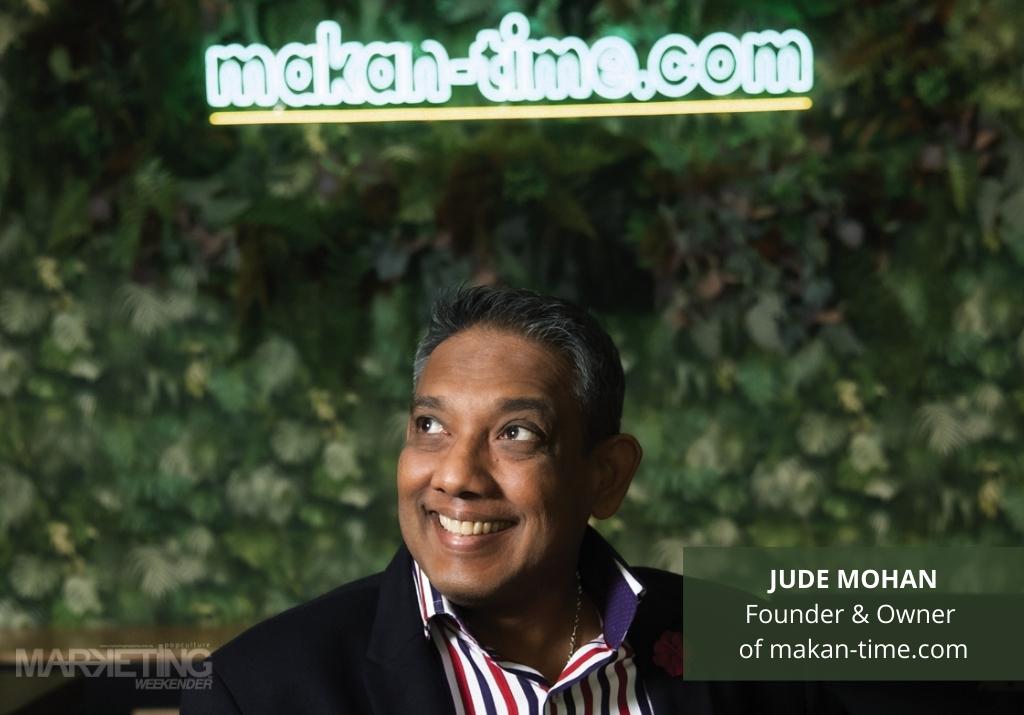BY THE HAMMER
Malaysians speak of “makan” evocatively and to many of us, it is synonymous with abundant food, and food in Malaysia strongly signifies life, love, and lavishness.
The word makan is often used as a greeting instead of a verb. Malaysia’s makan culture is indeed a gift for the world to enjoy. And from it Malaysia has created many passionate purveyors of fine food.
There are few people in this country who share a gargantuan passion and an unquenchable curiosity for all things in the makan universe more than Jude Mohan, the former adman and corporate captain who left his cushy corner office at a public company to pursue his preferred science and his life-long obsession – Makan!
It wasn’t any wonder for us to learn that he had single handedly created a new icon in the Malaysian food service industry called makan-time.com.
We spoke to the affable man himself over some ‘teh-halia’ at his satellite kitchen for makan-time.com in Bangsar, and the first question he shot our way was “Bro, makan already?”
“I hope you came with an empty stomach!”
We realized later that the perennial question was indeed a loaded one as he kept feeding us one dish after another followed by anecdotes of its origins, cultural history, flavour profiles, aroma, sustainability and even its birth sign!

Makan-time.com is an innovative, efficient, and advanced meal solutions provider in Malaysia. It owns and operates two fully licensed, Muslim-compliant central production kitchen facilities, located in Kuala Lumpur, and is currently the leading player in the food outsourcing space involving local hotels and corporate meal solution providers. It also currently owns 6 exciting consumer food brands in its stable. These 6 brands and their unique take on Malaysian foods are offered exclusively to consumers in the Klang Valley through their own digital food hall and platform naturally called, www.makan-time.com.
We took the opportunity to candidly grill Jude with some questions about his 8-month-old start-up over a foot-long, butter chicken sambal, grilled ‘Naanwich’, another distinctive creation of this Adman, or should we say Madman. And the results were quite astounding.
Jude, why did you decide to start something in the food service sector when you could have gone into many industries which you had experience in and had strong connections to? Isn’t this somewhat of a virgin territory to you?
Truth is a lot of people who knew me well kept prodding me to open a restaurant. I wasn’t the least bit interested. I was just bent on starting a revolution in the food space – a disruptive industry which would help change the way people consumed their food.
Change the way industries and players in the food space would operate. I wanted to give consumers a platform to consume their food with dignity. I wanted to feed them with food that was safe yet addictively good. I wanted to feed them with food I would feed my own family with. I wanted the secret ingredient in every dish to be, LOVE.

Yes, lofty outcomes as usual from me, but I knew that if I had a sound process to make all these aspirations work and a relevant food technology plan to back these up, it wouldn’t sound so lofty anymore. Coupled with some experienced hotel Chefs steering the yacht in the engine-room, we could be sailing the seven seas like Ferdinand Magellan.
So, I went about to immediately acquire the most important commodity of them all – Data. Data, like the British Crown Jewel Koh-i-Noor, is impossible to find in Malaysia. Especially if it concerns food service and its industry related data in Malaysia. But I found the much-needed analysis in Singapore and in Indonesia. So, this became the beacon which gave me the insight I needed to make informed decisions with the planned start-up.
The data concluded that players in the food service industry like hotels and such, were growing tired of managing staff and keeping up with their kitchens. Productivity and wastage were always their bone of contention. Rising food costs were another issue. Fluctuations in costs meant that bottom lines were scorched and pilferage and siphoning, the original and oldest professions in the world, kept wreaking their deadly damage.

What if we could take these problems off them? What if we cloned a central kitchen facility which matched the kitchens of these hotels, kept to their stringent process requirements, used only trained and experienced professionals which they would approve of, and give them end-products which were better than their own? What if we could be more reliable, more advanced, more predictable, and more profitable than their own kitchens? I knew that data, insights and the correct technology could achieve this…
So, you started makan-time.com?
Not so simple, mate. I had to do scores of spread sheets first. What seemed like 2937 spread sheets later, I realised that to monetize the central kitchen facility and to fortify its profitability, I needed a few more unique but synergistic lines of business to close some gaps in the business plans. Our data suggested that the corporate meal solutions space in Malaysia lacked strong players who were dedicated to serving this sector. Players who had speed, agility and who were able to represent their services articulately, were scarce, not to mention disorganized. Since we had everything in our plan to now serve the corporate sector eloquently and efficiently, this became another key line of business and focus in our plan.

When we looked at the actual order-book numbers, some multi-nationals in the Klang Valley were providing 3 square meals for 700 employees per day. That’s a staggering 2,100 meals per day from just one corporation alone. So, the decision to become a dedicated player in the corporate meal solutions space was a no brainer since we already had the infrastructure in place, and a manageable competitive space to contend with. We jumped in with both eyes open.

What about the consumer digital food hall and all the food brands which you created? How did that come about? Was that because of the MCO and you felt it was a lucrative time to get into that space?
So, here’s where the passion play comes in. You see the digital food business which reaches out directly to consumers has been romanticised by social media to such an extent that people perceive it to be a journey like Julia Roberts and Richard Gere’s “Pretty Woman” movie. Today almost 2 million people are in this home to consumer, or business to consumer, food delivery space. Unless you are thoroughly structured to scale and mine the numbers, meaning to cater to volume sales, the likely ending to this food delivery journey is akin to the movie “Titanic”. Ask many in this space and they will tell you that it’s a painful, financially, and emotionally draining experience.

Too many players in one space in the Klang Valley vying for the same consumer and in the same breath being raped and looted by Super Apps! You lose more than 30% off your bottom line for using a Super App to reach your intended audience. So, when you end up making two bucks or less per sale, it becomes ridiculous! A lot of people don’t do the math, and that’s why they crumble. They end up in debt. Its very sad, really, to see our Malaysian folk try their hand at an honest day’s work only to be screwed for what they think will help them survive.
So why the digital foodhall? I mean really, it sounds like its suicidal!
I started the digital food hall for several reasons. Firstly, if you look at the state of the digital food business today, you will realize that it’s a rough, cut-throat market out there, albeit it’s a consumer’s market, where the consumer benefits from the price war. But the food arrives in a deplorable condition. Sadly 100% plastic. Leaky food vessels. Compromised food quality and health standards. Lousy food, etc. And… I can go on and on and on until you have a ‘food for thought’ coma.

I wanted to cut through this clutter and provide a “premium makan experience” for Malaysians. One which you will thoroughly enjoy and most importantly one which will allow you and your family to eat with dignity. I wanted the “premium makan experience” to have a popular price. I wanted this “premium makan experience” to be 100% eco-compliant. I wanted to teach our young people (and old ones too) that the eco threats we face are real and brutal, but we can prevent or at least reduce the catastrophe by consuming our meals daily in entirely plastic-free wares and in compostable, renewable vessels. It cost us quite a bit to provide these, but it must start with us. This is our commitment to the environment. Or else we will be like everyone else, all talk and no walk.

I cannot believe that the solution from supermarkets to go eco friendly is to profit from selling you a plastic bag instead of eradicating it completely. It is sheer bollocks!
I went back to the data on Malaysia food consumption and learnt that the top 10 foods purchased digitally by Malaysians in the Klang Valley daily were common staples.
I kept to this guide religiously but enhanced the menu offering, elevating it to assume a new form and finish, yet producing the flavours which Malaysian palates crave and desire. Then I created the brands, giving each its own essence and personality, pairing it with the foods which the data suggested Malaysians couldn’t do without.
From here it was a labour of love. For over a thousand hours, my Chefs and I developed a familiar but unique menu (roughly 79 options), to entice Malaysians in the Klang Valley. Some of the recipes were from my grandmother, and our Chefs brought in their own mothers into our kitchen to develop authentic ‘mother-sauces’ during the prototype stage. It was quite an emotional experience for all of us. The food we created truly contained Love.
We put all these dishes up on our order site (order.makan-time.com) and launched it in the Klang Valley to consumers, before Christmas.
And the rest as they say, is food history.

So where does this digital food hall go from here? What is its natural evolution since this space is highly competitive? Do you have a sound plan to disrupt this space too?
The plan really is to create value from the brands which I created. Brands are like people. They are real. They evoke emotions from the consumer. They entice, they seduce, they please. There is humungous value in brands when they are well nurtured and navigated.
All our brands are trademarked. We also own our own platform and manage our own digital branding and marketing team to influence the consumer market relevantly. This is our play in the digital business stage. It is our foray into the digital consumer space. All these equate to value. So, we need to amplify the role of these assets to monetize them logically. One practical step at a time.
Remember the poor Malaysian folk who keep getting screwed by circumstances which they must contend with in the food delivery business? Well, I have a plan for them. With the brands which we have crafted and the food products which have been created from consumer data, we can develop multiple attractive franchise opportunities for these folks.

As we go along, we will create more and more brands and offer them up for franchising according to food trends, viral statistics and current market data. We are looking at small kiosks in malls. This is most practical especially for the B40, whom we aim to assist the most. We provide the Malaysian entrepreneur Joe or Junaidah with everything from the finished product and technology to the packaging, digital marketing support, a sound business plan, sales tools and even a point-of-sale system. All they need to do is stand behind the counter, smile, make the sale, and take home a handsome cut. Simple kan?
We will provide hands-on management support and guide for these folks so that they are in a stronger position to succeed, and we will provide them with data driven, fool-proof tools to succeed. We have the experience and the know-how to do so, competently.
So far, do you have any investors or funders who are backing your operations and fueling the roll out of your exciting plans for the future?
The simple answer to this is, NO. I am self-funded, and I put my money where my mouth is.
Anyway, it is too early to seek funders. We won’t attract much if we discussed external investments at this stage.
I would like to build this start-up to become a darling among Malaysian brands before we discuss any investment plans. Having said that, we have had many suitors.
Flattering as this may seem, we have had to humbly decline.
Any last words for our readers today, Jude?
Come, Makan. Guarantee Puas Hati!
“Disrupting The Food Service Sector” was the cover story for MARKETING WEEKENDER Issue 333.
MARKETING Magazine is not responsible for the content of external sites.










